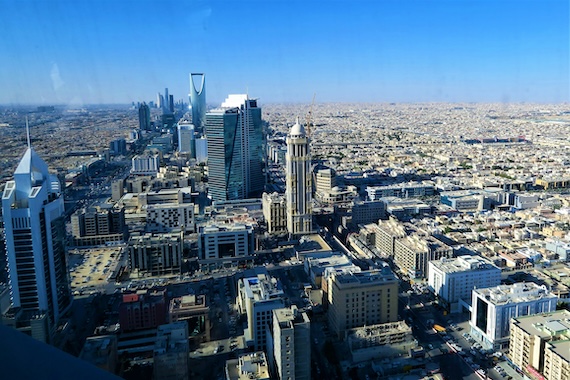( RFE/RL ) – After facilitating the first high-level talks between U.S. and Russian officials since the Ukraine war began, Saudi Arabia is now reportedly positioning itself as a mediator in another high-stakes negotiation — this time between the United States and Iran.
CNN, which first broke the story, reports that it remains unclear whether the Saudis have formally offered to mediate. Still, analysts suggest Riyadh has strong incentives to broker talks and may be better positioned than traditional mediators to bring the U.S. and Iran to the negotiating table.
“Riyadh is looking for a way to address concerns around Iran’s nuclear program, as well as its regional activities and its support for proxies,” says Gregory Brew, senior analyst at the U.S.-based Eurasia Group.
“Given Riyadh’s interest in avoiding an escalation in the Gulf, it probably sees diplomacy as a more effective means of addressing these issues, rather than military action,” he added.
Saudi Seeking Stability
Saudi Arabia cut relations with Iran in 2016 after its diplomatic missions were attacked by protesters angry over Riyadh’s execution of a top Shi’ite cleric. Two years later, when U.S. President Donald Trump withdrew Washington from the 2015 nuclear deal with Iran, the Saudis were among Iran’s adversaries who celebrated the move.
In 2019, Yemen’s Iran-backed Huthi rebels launched a major drone and missile attack against Saudi oil facilities, severely disrupting the Kingdom’s crude production.
But much has changed since then, thanks to a Chinese-brokered deal in March 2023 that led to the restoration of relations between Tehran and Riyadh.
Saudi Crown Prince Muhammad bin Salman has long sought to position his country as a global economic and diplomatic powerhouse under his Vision 2030 plan, which aims to diversify the Kingdom’s economy and reduce its reliance on oil.
To achieve that, however, Saudi Arabia needs stability in the Middle East.
“Saudi Arabia’s willingness to moderate between Tehran and Washington was not borne of a political vacuum,” said Behnam Taleblu, senior director of the Iran Program at the Washington-based Foundation for Defense of Democracies (FDD).
“By stylistically accommodating Tehran through diplomatic normalization but substantively remaining in the Western orbit, Riyadh is hoping to insulate itself from being the place where a larger regional conflict involving Iran is adjudicated.”
While the Islamic republic officially insists it is not pursuing a nuclear weapon, there has been growing discussion in Iran about weaponizing its nuclear program — especially as Tehran’s regional proxies, long seen as its primary deterrent against Israel and the United States, have suffered setbacks.
Abdulaziz Sager, the chairman of the Saudi Arabia-based Gulf Research Center, told RFE/RL’s Radio Farda that Riyadh “firmly says” it’s up to Iran whether it wants to maintain its peaceful nuclear program.
He added, however, that Iran’s expansion of its nuclear program following Trump’s withdrawal from the nuclear accord “does not give assurances” that it will remain peaceful.

Photo by ekrem osmanoglu photo of Riyadh, Saudi Arabia on Unsplash
Iranian Incentives
Iran’s Supreme Leader Ayatollah Ali Khamenei last month dismissed the prospect of direct talks with Trump over a new nuclear deal, insisting that the U.S. president cannot be trusted.
This is where Saudi Arabia can prove decisive and flex its diplomatic muscles, experts say.
On paper, the Saudis can offer to the Iranians things that traditional mediators, namely Oman and Qatar, may not be able to offer, said Brew.
Saudi Arabia has arguably benefitted more than Iran from the 2023 normalization deal, with many in Iran complaining that Tehran has gained little economically from restoring relations with the Sunni powerhouse.
“Iran is looking for ways of ensuring that it’s going to receive a degree of economic benefit from an agreement, and Saudi Arabia is a natural way of obtaining that if the Saudis can offer investment, trade, and other benefits,” Brew said.
Another incentive for agreeing to Saudi mediation is that just like former U.S. President Barack Obama could not guarantee that the Trump administration would remain in the 2015 nuclear deal, Trump cannot allay Iranian concerns about the next administration sticking to the deal.
“On the other hand, [Muhammad bin Salman] is going to be around for a long time, and there’s the potential for Saudi offers to sweeten the deal,” Brew argued.
Iran and the U.S. initially held secret talks in 2013 before holding public meetings that eventually led to the signing of the nuclear deal in 2015.
“Iran is likely to engage, especially if it is private, and force concessions simply for staying at the table or for turning off the spigot to activities it can easily resume at a time of its own choosing,” FDD’s Taleblu said.
Hannah Kaviani of RFE/RL’s Radio Farda contributed to this story.
Copyright (c)2024 RFE/RL, Inc. Used with the permission of Radio Free Europe/Radio Liberty
Via RFE/RL


 © 2026 All Rights Reserved
© 2026 All Rights Reserved